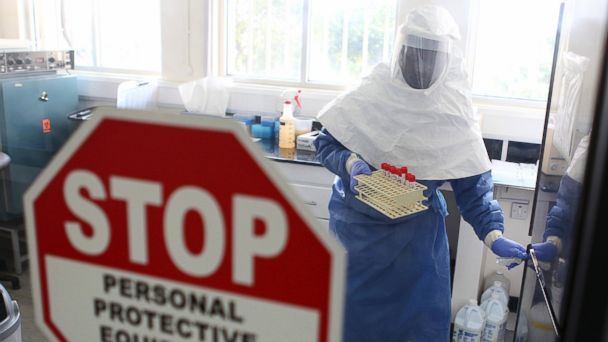Canadian Man Tests Negative for Ebola

A doctor works in a laboratory on collected samples of the Ebola virus at the Centre for Disease Control in Entebbe, southwest of Uganda's capital Kampala in this Aug. 2, 2012 file photo. (Credit: Edward Echwalu/Reuters)
A Canadian man who returned from Liberia with what health experts feared was the Ebola virus tested negative for it early this morning, according to the World Health Organization.
Health officials have not yet confirmed made the man ill, but his travel history, symptoms and the current Ebola outbreak in Guinea prompted officials to test Dr. Denise Werker, the deputy chief medical officer of Saskatchewan, at midnight on Monday.
Early today, tests confirmed he had neither Ebola, Lassa, Marburg nor Crimean Congo viruses.
"The person is hospitalized in an acute situation in an intensive care unit," Werker said during a news conference. "This person was not ill when he traveled, and the incubation period for both Ebola hemorrhagic fever and Lassa fever can be as long as 21 days. This person was well in Canada and came down with symptoms."
The man's lab specimens were tested at the biosafety level 4, or BSL-4, lab in Winnipeg, Canada. A BSL-4 lab requires the most stringent safety measures because it is where researchers study diseases with no vaccines or cures.
Ebola hemorrhagic fever has no cure and is often fatal in humans and other primates. Its symptoms can take days or weeks to surface after exposure to the virus, according to the Center for Disease Control and Prevention. They include fever, weakness and stomach pain, but some patients may also have red eyes, a rash, internal and external bleeding.
"It's not a pleasant kind of sight when you have that kind of bleeding from a human being," Werker said.
However, Werker said Ebola is not particularly contagious to those who are not health workers.
"You have to be in close proximity to a person's secretions," she said. "You actually have to touch person's secretions, whether it is blood or nasal or saliva secretions."
Still, the patient has been isolated, and those working with him are required to wear goggles, masks, gowns, gloves and boots, she said.
This isn't the first Ebola scare in North America, said Dr. Thomas Geisbert, a microbiologist studying Ebola and other diseases at the University of Texas Medical Branch's BSL-4 lab in Galveston. In 1989 and 1990, monkeys infected with a strain of Ebola virus were shipped to a facility in Virginia. Although people there developed antibodies for the virus, they did not get sick, according to the CDC. The scare inspired the bestselling novel, The Hot Zone.
"It's obviously a relief if it's not Ebola or Marburg," Geisbert said, adding that fatality rates depending on the strain can be up to 90 percent. "They're trying to make sure it's not something new that we haven't identified before."